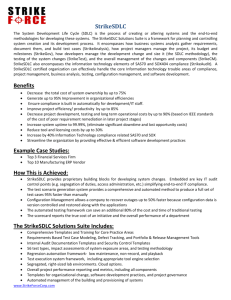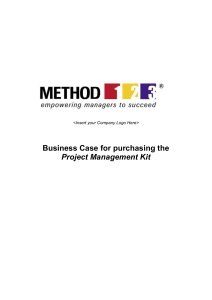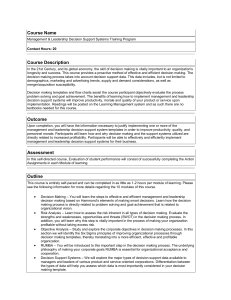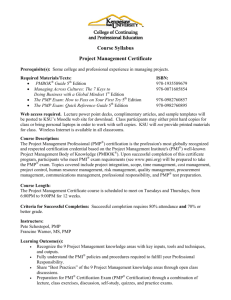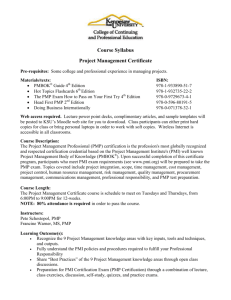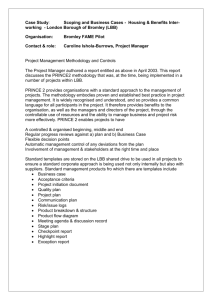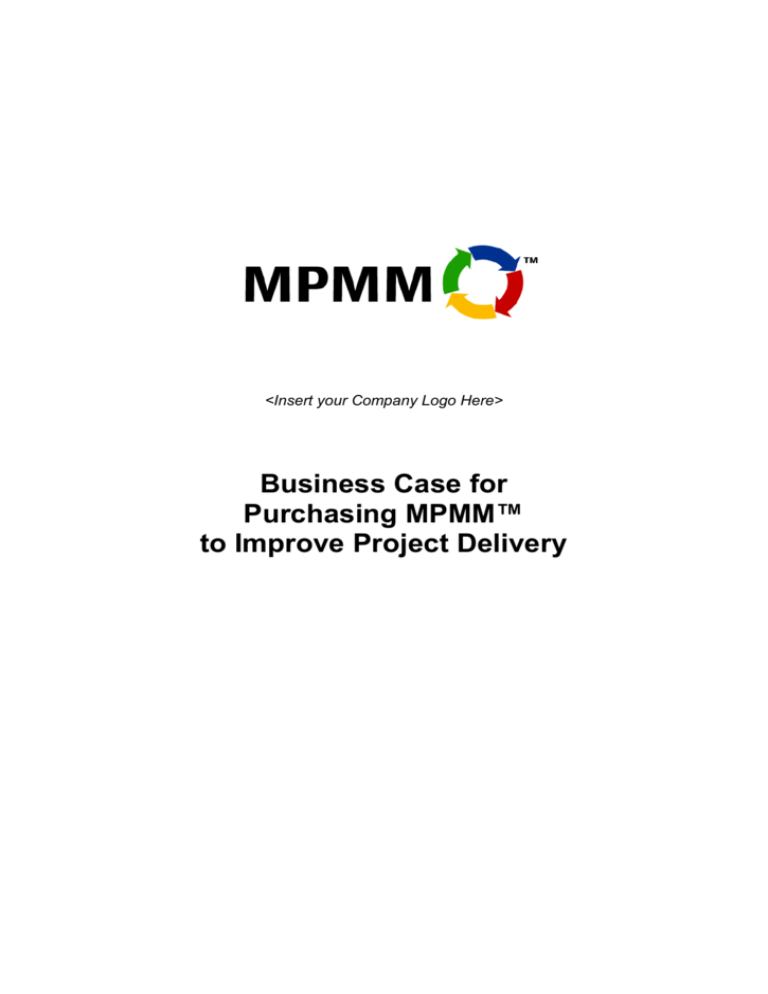
<Insert your Company Logo Here>
Business Case for
Purchasing MPMM™
to Improve Project Delivery
1 Executive Summary
The Method123 Project Management Methodology (MPMM™) is a complete methodology
for undertaking projects. It provides a solid framework for managing projects, by explaining
in depth, how to undertake every phase, activity and task within the Project Lifecycle. In
addition to providing a complete project framework, it also includes the full set of document
templates, forms and checklists needed to ensure that teams never have to “start-fromscratch”. And finally, a complete suite of case studies are included to provide us with
practical, real-life examples of project excellence.
By purchasing MPMM™, we will be able to implement a best practice methodology for
undertaking projects within our organisation. This will enable us to improve our project
delivery efficiency, thereby increasing the return on each project investment.
It is recommended that we purchase a [no. user] multi-user license for MPMM™ [edition], at
a special price per user of [see MPMM multi-user pricing]. The total cost is [amount].
Approval is immediately sought to proceed with this purchase.
2 Business Problem
2.1
Business Analysis
Our company <company name> specializes in delivering <product / service name> for our
customers. As we are focused on achieving a high level of customer product and service
delivery, we often have improvement programs underway, in the form of projects. We
generally undertake many projects simultaneously, some of which are critical to maintaining
our competitive edge in the marketplace.
Managing multiple improvement programs with multiple projects and multiple teams can be a
high-risk activity. We need a proven, best-practice methodology for delivering projects
efficiently to ensure that we gain the requisite business benefits for our organization. We
also need standard project processes to improve the manner within which projects are
undertaken, as well as a wide range of pre-completed templates to reduce the time taken to
complete project deliverables.
2.2
Problem Analysis
By not adopting a standard set of processes and templates, projects often experience:
Scope creep
Unexpected costs and required effort
Reduced quality of deliverables and products
Exceeded timeframes and unachieved milestones
Mis-communication and higher staff turnover
Unexpected issues which impact delivery
Under-performing suppliers
©2003 Method123 Ltd. All rights reserved.
To minimize the risk of our projects experiencing those same symptoms, we need a
standard approach for undertaking projects. If we are able to promote a common Project
Lifecycle approach within our organization, using standard project management processes,
then we can improve our project delivery efficiency and therefore increase our likelihood of
achieving project success.
Standard project processes we need to implement include:
Change Management
Risk Management
Issue Management
Time Management
Cost Management
Quality Management
Procurement Management
Acceptance Management
Communications Management.
We also need to implement a suite of document templates to save us from re-inventing the
wheel each time we create project deliverables.
In summary, we need to purchase a Project Management methodology which contains:
A clear, easy to understand, Project Lifecycle
A suite of well defined project management processes
A set of project templates supporting each activity in the lifecycle
3 Available Options
After completing a research exercise, we have found that:
While there are a vast range of offerings in the marketplace, very few actually contain a
complete project management methodology, as well as a suite of templates and case
studies to help us to improve our project delivery.
Most providers offer a range of miscellaneous project templates which don’t fit together
to form a complete Project Lifecycle
Most methodologies and templates are written to fit just one type of industry (typically
Information Technology).
Few providers actually offer a generic methodology to suit all project sizes, types and
industries.
Given the above constraints, we have identified 3 alternative options:
1. Implement the MPMM™ project management methodology, including the full suite of
document templates and case studies. See www.MPMM.com
2. Implement the principles set out by the Project Management Institute (PMI®) as defined
within A Guide to the Project Management Body of Knowledge (PMBOK® Guide). See
www.pmi.org
3. Implement the principles and practices set out by Prince2®. See www.prince2.co.uk
©2003 Method123 Ltd. All rights reserved.
3.1
Options Analysis
Option
1
2
3
Description
Implement
MPMM™
Adopt the
PMBOK®
Adopt
Prince2®
Synopsis
The MPMM™ Project Lifecycle suits all types of industries and project sizes.
Every activity within the lifecycle is described in depth and is complemented by a
complete suite of document templates. More than 50 templates are provided, covering
every aspect of the project lifecycle.
Their phase, activity and task descriptions are incredibly detailed, as they contain
specific instructions for completion as well real life examples, charts and tables.
It also includes an entire suite of case studies, providing teams with practical examples
of project management excellence.
MPMM™ is based on PMBOK® and Prince2™. It simply adds depth to those project
management standards by enabling them to be practically implemented.
The PMBOK® is the world-wide standard for Project Management.
It includes a set of principles and processes for undertaking all project types.
The principles and processes are very generic and therefore only act as guidelines,
rather than specific project procedures.
The methodology does not come with a detailed set off project templates.
Prince2® is the UK standard for Project Management.
Like the PMBOK®, it includes a generic set of principles for undertaking projects.
It was originally written for IT projects and does not cater for projects types and sizes.
It includes a small number of templates which only cover part of the project lifecycle.
©2003 Method123 Ltd. All rights reserved.
Cost
See www.MPMM.com for multi-user
pricing
The PMBOK® is provided to
members of the PMI®. See
www.pmi.org for membership fees. It
is a brief handbook and does not
contain any detailed activity
descriptions, templates or case
studies.
See www.prince2.co.uk for
Corporate pricing. Prince2®
Corporate licenses are between
100% - 200% more expensive than
MPMM™.
4 Recommended Approach
4.1
Recommended Option
Based on the options presented above, it is recommended that MPMM™ (Option 1) is
approved for implementation.
4.2
Implementation
The following steps are recommended to implement MPMM™ within our organization:
Identify the number of user licenses required
Purchase the [edition] of MPMM™ from www.MPMM.com
Download and install the product to each users PC
Implement MPMM™ as our methodology for undertaking projects
Use the templates provided within MPMM™ to increase deliverable quality
Use the Case Studies provided within MPMM™ to train teams in best practice
Inspire project teams to follow the MPMM™ to improve project delivery success
5 Appendix
5.1
Supporting Documentation
The following sources were used to collate this document:
MPMM™ Project Management Methodology from www.MPMM.com
Research on the principles set out by www.pmi.org and www.prince2.co.uk
Searches for other “Project Management Methodology” and “Project Management
Templates” using Yahoo, MSN and Google.
©2003 Method123 Ltd. All rights reserved.

